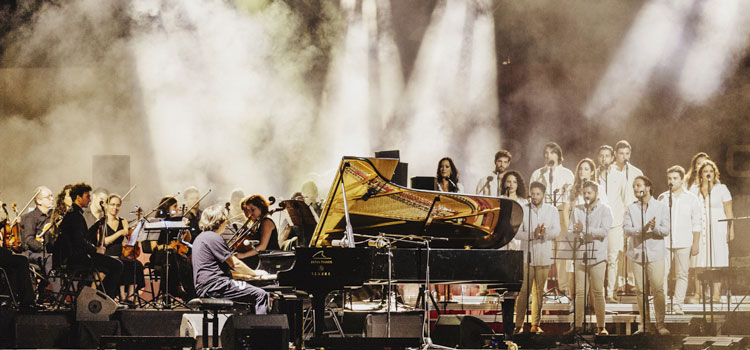Dorantes closes out the Bienal de Flamenco with a show inspired in the first circumnavigation of the Earth begun by Magellan in Seville in 1519.
Silvia Cruz Lapeña
The evening began like a wedding. A shuttle-bus at the entrance to the metro stop Blas Infante would take spectators and press to the Puerto de Sevilla where Dorantes had the mission of closing out the Bienal de Flamenco 2018. No sooner did we arrive, than everyone made a bee-line for the bar, it’s been very hot these days and we’d learned it was important to get hydrated before each concert. But at this point, there were many people and few waiters. Four to be exact, so the orders took longer than the pianist did to come on stage.
On the stage set up for the occasion with plastic chairs, several empty rows and the enclave, somewhat strange: transport containers and cranes surrounded the stage as if a fashion show were about to be filmed. It’s your choice: narcos, corruption, contraband or all of the above. Behind the Lebrija musician and his piano, the Orquesta Bética directed by Michael Thomas. On the side, the chorus of students from the Cristina Heeren Foundation, and elaborate percussion: Antonio Moreno and Javi Ruibal. It was these two, along with the pianist, who served the musical aperitif: a delicious morsel in which they made rhythm with a container using hands, bodies and drumsticks.
At the start, it looked promising, it was strong, you could imagine in that same spot 500 years ago, a group of 239 men setting sail on a voyage that could be a film. Because that was La Roda del Viento, a show with which the idea was to kill two birds with one stone: close out the most important flamenco event of the year and inaugurate the commemorative acts of the 500th anniversary of the first circumnavigation of the Earth begun by Magellan and finished by Elcano in the capital of Andalusia.
It was a risky choice, mostly because the 2018 event hasn’t been such a brilliant Bienal as to have it share the limelight with another event. Only a firecracker ending, a sudden burst of energy and emotion, could make this linking feasible. But that’s not how it went.
The whole story
Dorantes is an extremely gifted musician and a sensitive creator, but this wedding was loveless, it was commissioned. You could see the desire and the struggle to get it right, but also the absence of sincerity. Of course there were attempts to stir emotions, for example when the phosphorescence of St. Elmo’s fire was evoked and you could see the sailors on the masts of their ships. And also some drama, such as when the concert evoked scenes of hunger, insurrection and fear experienced by the people on the five ships that left from Seville in 1519.
But something more was needed than the place to take us back to that moment and era. Perhaps a bit of theater, perhaps a different stage set, perhaps for this reason there was barely a small thrill. Nor could you feel the excitement which is present in Antonio Pigafetta’s story, the man who chronicled the Victoria ship, the only one that returned to Spain with 18 survivors: “in order not to die of hunger, we had to eat pieces of leather”.
There wasn’t any thrill, not even the complete story. The magnificent biographer, in his way, that was Stefan Zweig, wrote about the life of Magellan and therein, not only accumulated relevant happenings, but also sketched the backdrop of moral superiority of that adventure legitimized by the church, that saw in the trip an opportunity to attract new Christians. It’s very hard to represent those ideas in a concert, but it’s unlikely they’ll appear in the commemorative acts planned for 2019, where the organization is centered on the fact that the voyage of Magellan was the odyssey that made the first step towards globalization, and demonstrated that the Earth was round.
No “oles”
In La Roda del Viento there were tanguillos and siguiriyas in the style of Dorantes, and the pieces interpreted by him and the percussionists were, without a doubt, the best part of the show. But the group came off as dull and more tension was needed, something more like a fiesta finale. The work seemed to look more to the future, to 2019, than to the closure of the Bienal, perhaps because the organizers are anxious to leave behind all the problems that came along with the development and birth of the project.
The audience applauded, but there was no chemistry between Dorantes and his show, or between the show and the audience. It would have been better to leave the Lebrija man to his instincts, with no imposed theme, and no specific commission, and perhaps there might have been space to let his hair down, become intoxicated or lose an earring celebrating. The tone of the concert was clearly reflected in the moment chosen by the audience to begin lining up for the shuttle bus that would take them home: before the encore. And that’s considering that Magellan’s and Elcano’s voyage brought to the stage lasted just over an hour in which barely an “ole!” was heard.
Photos: Oscar Romero / La Bienal
